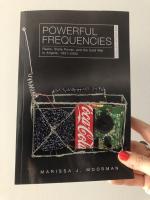 Historian Marissa Moorman wrote an important book about radio and modern state power. "Only radio receivers can feel radio waves. But people feel radio. Radio, Moorman reminds us, courses through our lives everywhere we go and alongside everything we do."
Historian Marissa Moorman wrote an important book about radio and modern state power. "Only radio receivers can feel radio waves. But people feel radio. Radio, Moorman reminds us, courses through our lives everywhere we go and alongside everything we do."
To read
15.11.2019 | by Jesse Bucher
 "Mom had this incredible energy. You know science says 'energy cannot be created not destroyed'. The fact that her body has left us doesn't mean she isn't with us. She is everywhere. That's why I got this tattoo: It says 'Death cannot kill'. Though she has left this place, she still continues to teach me a lot".
"Mom had this incredible energy. You know science says 'energy cannot be created not destroyed'. The fact that her body has left us doesn't mean she isn't with us. She is everywhere. That's why I got this tattoo: It says 'Death cannot kill'. Though she has left this place, she still continues to teach me a lot".
Face to face
14.11.2019 | by Sinem Taş
 ‘The Missing Face’ is a powerful reflection on the war, and above all on the ownership of traumatic experiences of conflict, specifically at the end of Portuguese colonialism in Africa.
‘The Missing Face’ is a powerful reflection on the war, and above all on the ownership of traumatic experiences of conflict, specifically at the end of Portuguese colonialism in Africa.
To read
12.11.2019 | by Felipe Cammaert
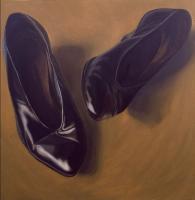 Museums are democratising, inclusive and polyphonic spaces for critical dialogue about the pasts and the futures. Acknowledging and addressing the conflicts and challenges of the present, they hold artefacts and specimens in trust for society, safeguard diverse memories for future generations and guarantee equal rights and equal access to heritage for all people.
Museums are democratising, inclusive and polyphonic spaces for critical dialogue about the pasts and the futures. Acknowledging and addressing the conflicts and challenges of the present, they hold artefacts and specimens in trust for society, safeguard diverse memories for future generations and guarantee equal rights and equal access to heritage for all people.
To read
07.11.2019 | by António Pinto Ribeiro
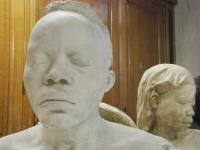 One of the other ways in which you see coloniality reemerge, is precisely in the mission the museum ascribes itself. "Africa" is an object of study while the idea of representativeness and the desire to be a window on a continent are the basic epistemological principles of imperialist logic. The scenography continues the "chosification" and "domestication"
One of the other ways in which you see coloniality reemerge, is precisely in the mission the museum ascribes itself. "Africa" is an object of study while the idea of representativeness and the desire to be a window on a continent are the basic epistemological principles of imperialist logic. The scenography continues the "chosification" and "domestication"
Afroscreen
23.10.2019 | by Marta Lança
 Beyond the old question of the relationship between ethics and aesthetics, the controversy encourages us to ask how rap – understood as a site for the denunciation of racism and the visibilization of the daily life of racialized, subordinated groups – has, itself, been complicit with other kinds of invisibilities and oppressions.
Beyond the old question of the relationship between ethics and aesthetics, the controversy encourages us to ask how rap – understood as a site for the denunciation of racism and the visibilization of the daily life of racialized, subordinated groups – has, itself, been complicit with other kinds of invisibilities and oppressions.
Stages
23.10.2019 | by Miguel Cardina
 'Pain is inevitable, suffering is optional'' says Steffen, walking slowly in the forest of Fisterra, in Galicia, Spain.
A peace activist who once served in the military at Operation Desert Storm, in 1990, he advocates for the human right to water and sanitation for everyone.
'Pain is inevitable, suffering is optional'' says Steffen, walking slowly in the forest of Fisterra, in Galicia, Spain.
A peace activist who once served in the military at Operation Desert Storm, in 1990, he advocates for the human right to water and sanitation for everyone.
Face to face
23.10.2019 | by Sinem Taş
 Reflecting on the relationship between humans and plants, this exhibition explores different narratives of technological mediation of the plant kingdom. The study of plants as infrastructure has raised interest among the scientific community over the last centuries, inspiring generations of researchers, as well as the development of technocosmologies and cybernetic systems.
Reflecting on the relationship between humans and plants, this exhibition explores different narratives of technological mediation of the plant kingdom. The study of plants as infrastructure has raised interest among the scientific community over the last centuries, inspiring generations of researchers, as well as the development of technocosmologies and cybernetic systems.
Mukanda
15.10.2019 | by Margarida Mendes
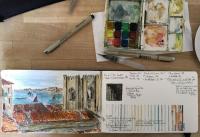 I imagine these as the “new navigators”, appropriating this controversial term to describe them in part because of their fearlessness, or perhaps more accurately their braving fear, in dis-covering, in the sense of recovering and uncovering, monstrous aspects of the past as a way to make sense of monstrous aspects of the present.
I imagine these as the “new navigators”, appropriating this controversial term to describe them in part because of their fearlessness, or perhaps more accurately their braving fear, in dis-covering, in the sense of recovering and uncovering, monstrous aspects of the past as a way to make sense of monstrous aspects of the present.
Games Without Borders
13.10.2019 | by Sharon Lubkemann Allen
 OUR SURVIVAL is at stake and the conditions and circumstances that are at our side are not just enough not enough and we have in a manner of ways been seeing this expressed in a diverse way on any given day on any given TV channel. There is an overall tension an almost thick layer of distrust, miscommunication, doubt, an insecurity that not only is taking place in the parliament of her magesty the queen but everywhere we consider to be touched by western values or whatever is left of them, such as Hong Kong is showing.
OUR SURVIVAL is at stake and the conditions and circumstances that are at our side are not just enough not enough and we have in a manner of ways been seeing this expressed in a diverse way on any given day on any given TV channel. There is an overall tension an almost thick layer of distrust, miscommunication, doubt, an insecurity that not only is taking place in the parliament of her magesty the queen but everywhere we consider to be touched by western values or whatever is left of them, such as Hong Kong is showing.
Games Without Borders
11.10.2019 | by Adin Manuel
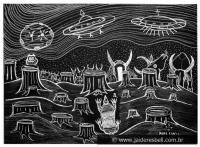 Although depleted of the colossal perspective lent to it by space navigation in the 1970s, the idea of humanity as a species was progressively turned into an immanent geological colossus capable of influencing the world’s cardinal rhythms – or at least such has been the description of its reach. Anthropocene is the geological epoch of the human species, it is said, and the proof lies in the sedimentary deposits that originated in the first nuclear experiments held in the 1950s. What is of course ignored is that this idea of “species” was artificially inseminated by the normative and cisgender marriage between modernity and colonialism, and that the colossal perspective is still believed to stop and stand outside motionless in front of the globe...
Although depleted of the colossal perspective lent to it by space navigation in the 1970s, the idea of humanity as a species was progressively turned into an immanent geological colossus capable of influencing the world’s cardinal rhythms – or at least such has been the description of its reach. Anthropocene is the geological epoch of the human species, it is said, and the proof lies in the sedimentary deposits that originated in the first nuclear experiments held in the 1950s. What is of course ignored is that this idea of “species” was artificially inseminated by the normative and cisgender marriage between modernity and colonialism, and that the colossal perspective is still believed to stop and stand outside motionless in front of the globe...
Mukanda
08.10.2019 | by
 Pathological states such as ‘land disease’, ‘tired head disease’ and even ‘disease caused by the hand’ allude to the states of anxiety, instability and vulnerability suffered by these communities, but also the loss of location in relation to the cultural and geographical space occupied by the subjects. They also convey the state of intense negotiation that exists between ‘negative supernatural forces’ and unequal social and political structures, in a place halfway between the land of origin and the land of arrival.
Pathological states such as ‘land disease’, ‘tired head disease’ and even ‘disease caused by the hand’ allude to the states of anxiety, instability and vulnerability suffered by these communities, but also the loss of location in relation to the cultural and geographical space occupied by the subjects. They also convey the state of intense negotiation that exists between ‘negative supernatural forces’ and unequal social and political structures, in a place halfway between the land of origin and the land of arrival.
I'll visit
04.10.2019 | by Rita Fabiana
 A bridge in Paris... Some dance on it, some watch them, smiling. Some are recording it on their phones, some timidly step forward and leave a little change on the guitar case. Wallace and Youmi continue singing their songs in the best office in the world...
A bridge in Paris... Some dance on it, some watch them, smiling. Some are recording it on their phones, some timidly step forward and leave a little change on the guitar case. Wallace and Youmi continue singing their songs in the best office in the world...
Face to face
02.10.2019 | by Sinem Taş
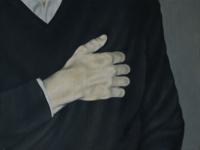 One that stands in contrast to the government’s disregard for democratic procedure – even as it claims to be pushing on the “people’s will” – was the publication of a book by University College London’ Press, with the title of The Responsibility of Intellectuals: Reflections by Noam Chomsky and others after 50 years.
One that stands in contrast to the government’s disregard for democratic procedure – even as it claims to be pushing on the “people’s will” – was the publication of a book by University College London’ Press, with the title of The Responsibility of Intellectuals: Reflections by Noam Chomsky and others after 50 years.
To read
01.10.2019 | by Paulo de Medeiros
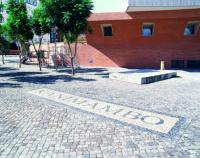 These visible and invisible movements, transparent or subterranean, brought a new vision of black cultural presence to the world in places far beyond Africa. They brought, too, a new perspective on an African continent. Portugal, which had historically opened its doors to the first waves of globalization, was looking to the future with realism and with desire.
These visible and invisible movements, transparent or subterranean, brought a new vision of black cultural presence to the world in places far beyond Africa. They brought, too, a new perspective on an African continent. Portugal, which had historically opened its doors to the first waves of globalization, was looking to the future with realism and with desire.
To read
01.10.2019 | by Margarida Calafate Ribeiro
 Next Future ended by opening up to the future, with a nod towards a Europe and a Eurocentrism which has hardly considered African and Latin American comic books, crime writing, science fiction or visual animation. A challenge to museums and virtual exhibitions was launched with the project-exhibition Unplace – Networked Art: Places-Between-Places.
Next Future ended by opening up to the future, with a nod towards a Europe and a Eurocentrism which has hardly considered African and Latin American comic books, crime writing, science fiction or visual animation. A challenge to museums and virtual exhibitions was launched with the project-exhibition Unplace – Networked Art: Places-Between-Places.
To read
01.10.2019 | by Margarida Calafate Ribeiro
 What we are looking for is a critical conscience for representations that are calcified or absent from the archives, building a debate about the modes of reimagination and ethical approaches – not only to those images that become archive-image but also to the image archives in their materiality.
What we are looking for is a critical conscience for representations that are calcified or absent from the archives, building a debate about the modes of reimagination and ethical approaches – not only to those images that become archive-image but also to the image archives in their materiality.
Afroscreen
18.09.2019 | by Maria do Carmo Piçarra
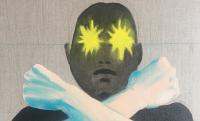 The mission of the EXCHANGE project (2015-2020) (2) is to reflect critically on the perpetuation of the “European dream” of a community of solidarity in which national, linguistic and cultural differences are overcome to produce a space in which citizens can move freely and safely. The surveillance technologies that the project studies have a shared feature: they are genetic machineries that seek to identify individuals for the purposes of criminal prosecution.
The mission of the EXCHANGE project (2015-2020) (2) is to reflect critically on the perpetuation of the “European dream” of a community of solidarity in which national, linguistic and cultural differences are overcome to produce a space in which citizens can move freely and safely. The surveillance technologies that the project studies have a shared feature: they are genetic machineries that seek to identify individuals for the purposes of criminal prosecution.
Games Without Borders
07.09.2019 | by Sheila Khan and Helena Machado
 Yonamine has theatrically composed the gallery walls with posters made out of a selection of articles from Zimbabwean newspapers, paintings and video animations, showing several graphic references of power such as Napoleon figure and the Ku Kux Klan uniform presented in a navy blue adulterated version colour that evokes the uniforms of Zimbabwe's workers. All these elements are presented as political propaganda in the eve of an election, personifying the conqueror's evil thirst to reach power and control by keeping the opposition voiceless.
Yonamine has theatrically composed the gallery walls with posters made out of a selection of articles from Zimbabwean newspapers, paintings and video animations, showing several graphic references of power such as Napoleon figure and the Ku Kux Klan uniform presented in a navy blue adulterated version colour that evokes the uniforms of Zimbabwe's workers. All these elements are presented as political propaganda in the eve of an election, personifying the conqueror's evil thirst to reach power and control by keeping the opposition voiceless.
I'll visit
26.08.2019 | by Cécile Bourne-Farrell
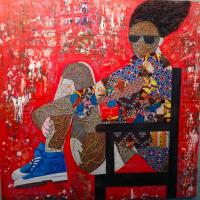 The regenerative pillars of society: in order to regenerate, to ill, to let something healthy grow again, we need democratic participation, environmental sustainability, social inclusion, and cultural diversity. These would be the main political goals. The cognitive tools to walk this way are critical thinking, artistic creativity, ethical technology and… that’s my point, the transformative power of media.
The regenerative pillars of society: in order to regenerate, to ill, to let something healthy grow again, we need democratic participation, environmental sustainability, social inclusion, and cultural diversity. These would be the main political goals. The cognitive tools to walk this way are critical thinking, artistic creativity, ethical technology and… that’s my point, the transformative power of media.
To read
25.08.2019 | by Carla Baptista